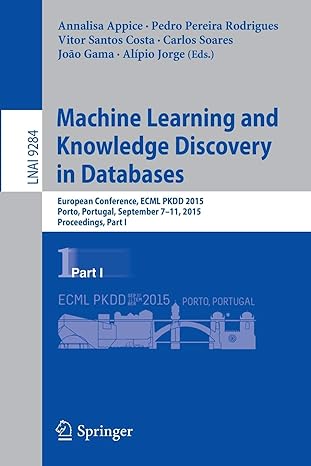Question
1. Expression Represents an infix expression to be evaluated. Use the provided pseudocode as a guide in completing this class. The question marks represent where
1. Expression Represents an infix expression to be evaluated. Use the provided pseudocode as a guide in completing this class. The question marks represent where to edit the code.
package p04;
/** * Represents an infix expression to be evaluated. */ public class Expression {
/** * A queue which stores the tokens of the infix expression in the order in * which they were input. */ Queue
/** * Expression(String) * * pExprStr is a string representing an infix expression, such as "(1 + 2) * * -3". This ctor uses the Tokenizer class to break the string into Token * objects which are stored in the token queue instance variable. * * PSEUDOCODE: Create a new Queue
/** * Evaluates the expression and returns the result as a Double. * * PSEUDOCODE: * Declare and create a Stack
/** * Accessor method for mTokenQueue. */ protected Queue
/** * Returns true when we need to pop the operator on top of the operator * stack and evaluate it. If the stack is empty, returns false since there * is no operator to pop. Otherwise, return true if the operator on top of * the operator stack has stack precedence greater than or equal to the * normal precedence of pOperator. */ private boolean keepEvaluating(Stack
/** * Since the negation and subtraction operators look the same we can * identify negation when: * * 1. The previous pToken is null (negation can be the first operator in an * expression but sub cannot) 2. Or if the previous pToken was a binary * operator (sub cannot be preceded by another binary operator) 3. Or if the * previous pToken was a left parenthesis (sub cannot be preceded by a left * paren) * * This method determines if pToken is really a negation operator rather * than a subtraction operator, and if so, will return a negation operator * pToken. If pToken represents subtraction, then we simply return pToken. */ private Token negationCheck(Token pToken, Token pPrevToken) { if (pPrevToken == null || pPrevToken instanceof BinaryOperator || pPrevToken instanceof LeftParen) { pToken = new NegOperator(); } return pToken; }
/** * Mutator method for mTokenQueue. */ protected void setTokenQueue(Queue
/** * topEval() * * Evaluates the "top" of the stack. If the top operator on the operator * stack is a unary operator, we pop one operand from the operand stack, * evaluate the result, and push the result onto the operand stack. If the * top operator on the operator stack is a binary operator, we pop two * operands from the operand stack, evaluate the result of the operation, * and push the result onto the operand stack. * * PSEUDOCODE: Declare and create Operand object named right = Call * pOperandStack.pop() Declare and create Operator object named operator = * Call pOperatorStack.pop() If operator instanceof UnaryOperator Then * Typecast operator to UnaryOperator and call evaluate(right) on it Push * the returned Operand from the above statement onto the operand stack Else * Declare and create Operand object named left = Call pOperandStack.pop() * Typecast operator to BinaryOperator and call evaluate(left, right) on it * Push the returned Operand from the above statement onto the operand stack * End If */
???
Step by Step Solution
There are 3 Steps involved in it
Step: 1

Get Instant Access to Expert-Tailored Solutions
See step-by-step solutions with expert insights and AI powered tools for academic success
Step: 2

Step: 3

Ace Your Homework with AI
Get the answers you need in no time with our AI-driven, step-by-step assistance
Get Started


